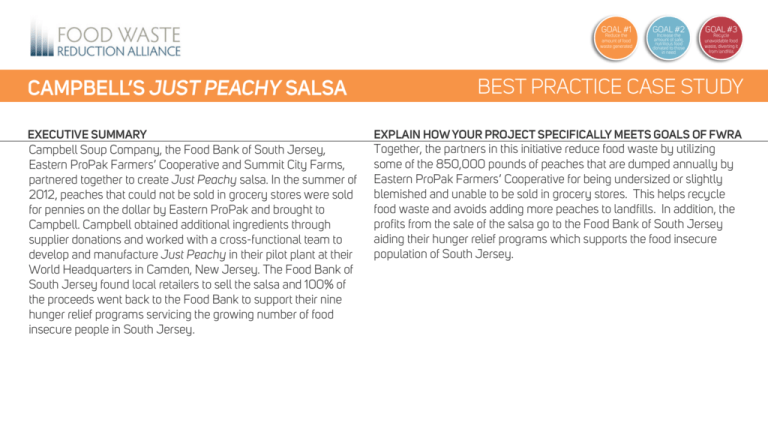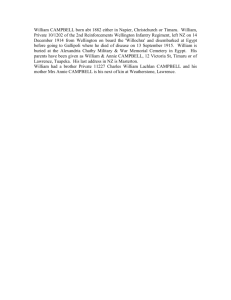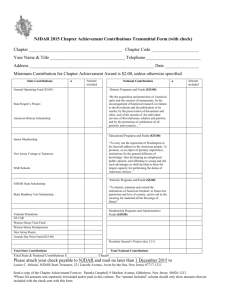BEST PRACTICE CASE STUDY CAMPBELL'S JUST PEACHY SALSA
advertisement

GOAL #1 Reduce the amount of food waste generated CAMPBELL’S JUST PEACHY SALSA EXECUTIVE SUMMARY Campbell Soup Company, the Food Bank of South Jersey, Eastern ProPak Farmers’ Cooperative and Summit City Farms, partnered together to create Just Peachy salsa. In the summer of 2012, peaches that could not be sold in grocery stores were sold for pennies on the dollar by Eastern ProPak and brought to Campbell. Campbell obtained additional ingredients through supplier donations and worked with a cross-functional team to develop and manufacture Just Peachy in their pilot plant at their World Headquarters in Camden, New Jersey. The Food Bank of South Jersey found local retailers to sell the salsa and 100% of the proceeds went back to the Food Bank to support their nine hunger relief programs servicing the growing number of food insecure people in South Jersey. GOAL #2 Increase the amount of safe, nutritious food donated to those in need GOAL #3 Recycle unavoidable food waste, diverting it from landfills BEST PRACTICE CASE STUDY EXPLAIN HOW YOUR PROJECT SPECIFICALLY MEETS GOALS OF FWRA Together, the partners in this initiative reduce food waste by utilizing some of the 850,000 pounds of peaches that are dumped annually by Eastern ProPak Farmers’ Cooperative for being undersized or slightly blemished and unable to be sold in grocery stores. This helps recycle food waste and avoids adding more peaches to landfills. In addition, the profits from the sale of the salsa go to the Food Bank of South Jersey aiding their hunger relief programs which supports the food insecure population of South Jersey. GOAL #1 Reduce the amount of food waste generated CAMPBELL’S JUST PEACHY SALSA HISTORY/BACKGROUND GOAL #2 Increase the amount of safe, nutritious food donated to those in need GOAL #3 Recycle unavoidable food waste, diverting it from landfills BEST PRACTICE CASE STUDY What issue drove the project? • Eastern ProPak Farmers’ Cooperative had 850,000 pounds of peaches that were ripe and edible, but were undersized or slightly bruised. These peaches were unable to be sold and were being dumped by Eastern ProPak at a cost of $80,000 in annual dumping fees. Simultaneously, the Food Bank of South Jersey was experiencing increased demand for food, distributing two million more pounds of food than the year prior and were facing federal funding cuts. They had a need for a sustainable revenue stream to support this growing food insecure population. How was the program developed? • The Food Bank of South Jersey was brainstorming ways to raise revenue to allow them to meet their growing demand. They discovered one local farmers’ cooperative dumps thousands of pounds of peaches each year that are undersized and slightly blemished, but ripe for donation. They distributed as many fresh peaches as possible, but when they had a surplus, they came up with the idea to create a shelf-stable salsa to sell at retail. They recognized they could utilize a business that they partner with often - Campbell. With the guidance and expertise of Campbell, the product was created and manufactured in August of 2012. It has been produced for four consecutive years. How was the baseline established? • Peaches that were supplied to the Food Bank of South Jersey for pennies on the dollar by Eastern ProPak allowed for some of the 850,000 pounds of peaches that are dumped each year to be diverted from landfill. How were responsibilities managed? • Eastern ProPak was responsible for supplying the peaches to the Food Bank. The Food Bank sourced prepping of the peaches. Campbell was responsible for creating the recipe, obtaining additional ingredients, and manufacturing, packing and performing quality control tests on the salsa. The Food Bank handled retail sales in local supermarkets, farmers markets and other Food Banks. Discuss partners/collaboration efforts. • Main partners include: Eastern ProPak Farmers’ Cooperative, Summit City Farms, the Food Bank of South Jersey and Campbell Soup Company. Suppliers that donated ingredients and packaging for production include Morton Salt, Sun Brite, Nature’s Quality, Mizkan America’s Inc., The Garlic Company, Owen Illinois, International Paper, Silgan, Rock Tenn, RTS Packaging, and Twin Pak. GOAL #1 Reduce the amount of food waste generated CAMPBELL’S JUSTNETWORK PEACHY SALSA FOOD RECOVERY & SODEXO GOAL #2 Increase the amount of safe, nutritious food donated to those in need GOAL #3 Recycle unavoidable food waste, diverting it from landfills BEST PRACTICE CASE STUDY RESULTS What are the long term implications of the project? • This is a program model for other food banks, growers and food companies to follow across the nation. Long term implications for the project include looking into other produce or foods that have a surplus that can be made into shelf-stable products to create revenue for Food Banks. The program demonstrates that problems such as food waste and food insecurity can be addressed by the collaboration of private and public partners. What barriers or challenges did the project overcome to be successful? • Barriers included several government and FDA regulations in creating a product that would ultimately be sold by another entity. This project has marked the first time the Campbell Pilot Plant was utilized to create a product for direct sale. Prior to the creation of Just Peachy, Campbell utilized the Pilot Plant to test new products, which later would be sent to their fully functional plants across the company. What are the social, economical and environmental benefits of the project? • It reduced the $80,000 dumping fees that farmers were paying to dispose of peaches prior to creating Just Peachy. • The project has generated approximately $250,000 in revenue over the past three years for the Food Bank of South Jersey creating a more sustainable revenue source for their nine hunger relief programs serving the food insecure population in South Jersey. • It reduced food waste in local landfills. • It allowed Campbell employees to participate in a skills-based volunteer activity and gave them the opportunity to bring their CSR goal “measurably improve the health of young people in their hometown communities” to life. • Created a healthy product for consumers that includes natural ingredients that is low in sugar and salt, and only 10 calories per serving. • It created a public-private partnership model that can be replicated across the country with other produce. For more information please contact Melissa Donnelly, Corporate Social Responsibility Specialist at mellissa_donnelly@campbellsoup.com






